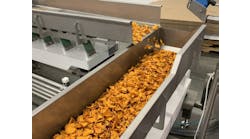From its first innovation in 1894 for improving butter in the local market to modern developments in aseptic packaging, Gehl's Guernsey Farms, Germantown, Wis., has always been quick to adopt new technologies. The company's latest search for a better scraped surface heat exchanger has led to big cost savings.Gehl's packaging innovations allow consumers to enjoy real dairy ingredients in ready-to-serve products that stay fresh without refrigeration. Chances are you passed a Gehl's nacho cheese and chili sauce dispenser the last time you were in a convenience store, movie theater or major league sports venue. In fact, Gehl's dispensers are the world's leading direct-from-pouch hot snack system.You also may have snacked on Gehl's pudding-in-a-cup or enjoyed a can of Main St. Café Iced Cappuccino. If you're on a low-carb diet, you've probably sipped on one of the diet beverages Gehl's packages for private label customers. All of these products are processed and packaged at the Germantown facility.The common thread among these products is they are all heat-processed and then cooled under aseptic conditions. The raw product is heated in six Thermutators from Waukesha Cherry-Burrell (WCB), an SPX Process Equipment Operation, to a temperature of 300-350°F. Then it flows into a hold tube for a period of time, depending on the type of product, viscosity and sterility requirements. The product is then pumped to a bank of 12 Thermutators for cooling to about 80° before packaging.Although this system met Gehl's sterile packaging needs 12 years ago, the cost to maintain the scraped surface heat exchangers (SSHEs) has become a concern. The first SSHEs were made of venjex, a carbon steel-based metal with a fused layer of boron on the heat transfer surface. The shafts and blades were stainless steel."Downtime was a big factor with the old tubes," says Douglas Werni, preventative maintenance manager. "They had to be honed every three to four months to smooth out the inside barrels, which cost about $1,200 per tube per year." Replacement costs were prohibitive, as well. Werni recalls the venjex tubes had to be replaced every two to three years at a cost of $8,000 each.Werni looked at outside solutions for these problems but also made his concerns known to WCB sales engineers. When WCB introduced a new stainless steel tube, it looked like the supplier had a solution to Gehl's maintenance and downtime problems.That solved Gehl's problems with the tubes, but Werni still was on the lookout for a better blade. When WCB introduced the stainless steel tubes, they were equipped with Teflon blades. Although this material caused less wear on the tubes than stainless steel blades, they still were not meeting the life expectancy Gehl's preventative maintenance program required.Werni asked for help from Advanced Process Solutions. The Jeffersonville, Ind., system integrator recommended a new polyaryletherketone polymer (PEEK) blade, which WCB recently had introduced. The blades are constructed of an FPA-compliant polymer that is widely regarded as the highest-performance thermoplastic material available.The blades were installed in the first heater in the processing line, where Werni's staff could monitor their performance. "I installed it into the first heater since that is where the raw product comes in, and I wouldn't have any scrapings from another tube that would affect its performance," Werni explains. "Every day I took them out and inspected them. After a week, I checked them once a week, then once a month. I was very happy with the performance and reduced wear."After changing over all six Thermutator heating units, the company now is in the process of replacing all of its other cooling units with the stainless steel tubes and PEEK blade design. Werni says he is monitoring their performance closely since the cooled product is more viscous and causes the SSHE to work harder."I've had the stainless steel tubes running for four years now without pulling them once," he says. Even though the stainless steel tubes cost a bit more, the company expects to get six to eight years out of them. Werni estimates the total savings will be $20,000 per tube over a six-year period. This doesn't include labor costs saved by eliminating a part-time person dedicated to maintenance of the units.In another processing line in the plant, Gehl's has replaced WCB Votators, originally constructed with nickel tubes and Teflon blades, to the new design as well. Although Werni is still monitoring performance, he estimates a savings of $1,800 per tube per year."The investment in the new tubes and blades was well worth the money," Werni concludes. "The blades last longer. There is not as much scuffing or wear on the blades. I'd recommend the stainless steel tube and PEEK blade design for any viscous product." For more information, call SPX Process Equipment at 800-252-5200 or see www.spxprocessequipment.com/sites/wcb/products/heatex/ssheatx.htm.

Latest from Plant Operations and Engineering
Latest from Plant Operations and Engineering

